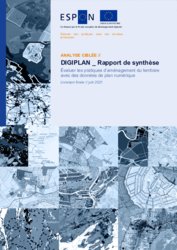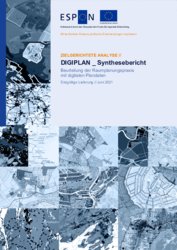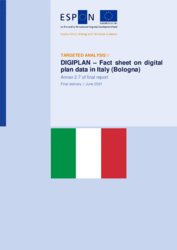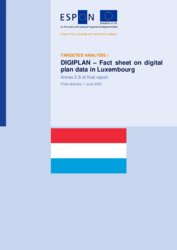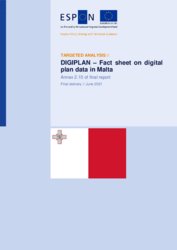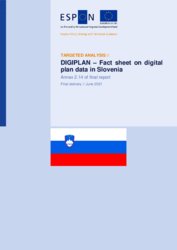DIGIPLAN - Evaluating Spatial Planning Practices with Digital Plan Data
Scope
Digitalization in public administration is gaining momentum in many European countries and spatial planning is no exception. The digitalization process is driven by ideas of efficiency, expressed for example in the concept of “smart cities” and “digital governance”, ideas of participation and improved public service, like “open government” and “open data”, and an aspiration for new economic growth and business opportunities based on this data. The topic of this ESPON Targeted Analysis is highly relevant as digitalization plays an increasing role also in spatial planning. At EU level, the digitalization of spatial plans and registers is already implemented in many countries. Although, despite the potential impact on planning processes, knowledge on the contribution of these new data sets to policy making is rare.
In the last decades, many European countries have taken significant steps to set up digital plan registers and the digitalization of spatial planning processes. Digital plan data opens a range of new possibilities to get insights into planning practice and the role of planning for spatial change over time. However, evidence on the possibilities offered by digital plan data and their actual use is missing.
DIGIPLAN shall contribute to analyse the approaches across different, national planning systems including methods for evaluation with plan data and how planning is actually represented in such data. DIGIPLAN shall analyse and compare the digitalisation of planning data in Denmark, Norway and Switzerland including the scope, organisation, financing as well as the current and potential future uses of digital planning data. The analysis should also provide an overview on digitalization of planning data in additional ESPON countries in order to offer a wider context for a better comparison.
Stakeholders' knowledge needs
A) Scope of digitalisation
- The scope of the planning data that has been digitalized
- Decision regarding the digitalization of additional planning data within the next two years
- Deliberations regarding the digitalization of additional planning data within the next five years
B) Organisation and financing of the digitalization
- The organisation of digitalization
- The financing of the digitalization
- Lessons learned in relation to the organisation and financing of processes of digitalization
C) Uses of digital planning data
- The current uses of the digital planning data
- The potential future use of the digital planning data
Main outcomes
- Overview of the digitalisation of planning data at European level (12 countries)
- In depth case studies and comparisons (6 countries)
- Thematic best practice papers
Stakeholders
- Danish Housing and Planning Authority (lead stakeholder), DK
- Ministry of Local Government and Regional Development, NO
- Swiss Federal Office of Spatial Development, CH
Contractors
- University of Copenhagen (lead contractor), DK
- Nordregio, SE
- Norwegian University of Life Sciences, NO
- Swiss Federal Institute for Forest, Snow and Landscape Research WSL, CH
Budget
€ 293,060.00
Lifetime
January 2020 - January 2021
Deliveries
- Inception delivery: 13 February 2020
- Interim delivery: 27 August 2020
- Final delivery: 4 February 2021
New:
The DIGIPLAN synthesis report has been translated in German and French! Please find them below.
Contact
Piera Petruzzi (Senior Project Expert) [email protected], György Alfoldy (Financial Expert) [email protected]
